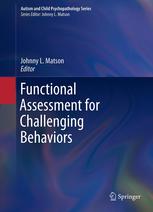

Most ebook files are in PDF format, so you can easily read them using various software such as Foxit Reader or directly on the Google Chrome browser.
Some ebook files are released by publishers in other formats such as .awz, .mobi, .epub, .fb2, etc. You may need to install specific software to read these formats on mobile/PC, such as Calibre.
Please read the tutorial at this link: https://ebookbell.com/faq
We offer FREE conversion to the popular formats you request; however, this may take some time. Therefore, right after payment, please email us, and we will try to provide the service as quickly as possible.
For some exceptional file formats or broken links (if any), please refrain from opening any disputes. Instead, email us first, and we will try to assist within a maximum of 6 hours.
EbookBell Team

5.0
38 reviewsAs the cornerstone of applied behavior analysis, functional assessment is supported by a burgeoning literature that focuses on identification of and interventions for aggressive, self-injurious, and other challenging behaviors. Although the number of research studies continues to grow, full-length volumes on using functional assessment to address these behaviors remain few and far between.
Comprehensive in coverage, Functional Assessment for Challenging Behaviors expands the knowledge base by providing information on all aspects of its topic. This unique volume addresses basic questions in salient detail, from types and rates of challenging behaviors to populations that warrant functional assessment. In addition, it examines typical assessment techniques, including interview, scaling, experimental, and invivo methods. The use of functional assessment in treatment planning – and in combination with other interventions – is covered in depth. An especially timely chapter identifies key ethical and legal concerns in working with challenging behavior populations.
Coverage includes:
Functional Assessment for Challenging Behaviors is an essential resource for researchers, scientist-practitioners, and graduate students in clinical child and school psychology, pediatric psychiatry and medicine, social work, rehabilitation, and developmental psychology.